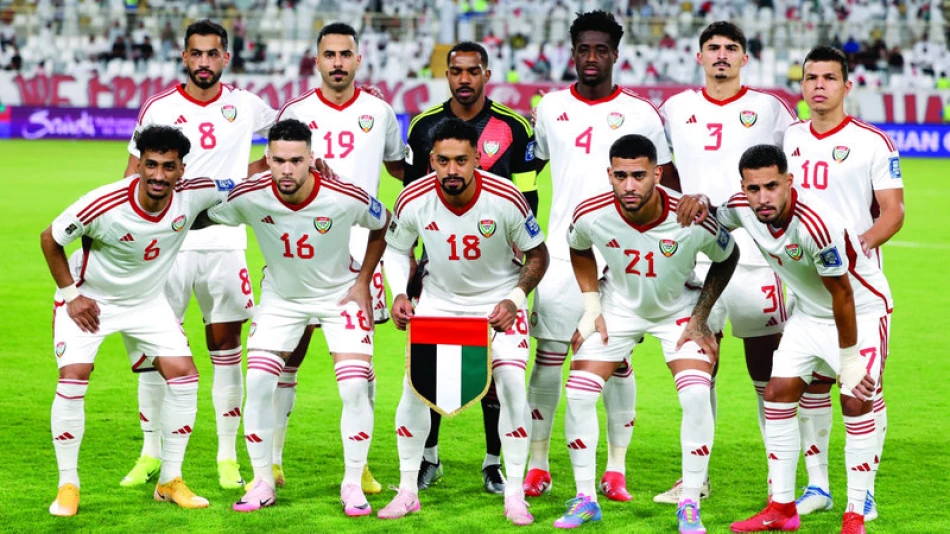
White Team Stands Two Steps Away from History and World Cup Qualification
UAE's World Cup Dreams Hang in Balance as Asian Playoff Draw Sets Up Gulf Showdown
The UAE national football team faces a make-or-break moment in their World Cup qualification journey after being drawn alongside Qatar and Oman in Group 1 of the Asian playoffs for the 2026 FIFA World Cup. With just two matches standing between them and football's biggest stage, the Emirates squad must navigate familiar Gulf rivals who know their strengths and weaknesses intimately. The stakes couldn't be higher: victory could write history, while defeat would extend a World Cup drought that has lasted since 1990.
A Balanced but Treacherous Path
Sports analysts have described the playoff draw as "balanced," meaning no team holds a clear advantage heading into the crucial fixtures. The UAE will open their campaign against Oman on October 11, before facing Qatar on October 14. This compressed schedule leaves little room for error or recovery.
The familiarity between these three nations adds another layer of complexity. Qatar and the UAE were grouped together in the third round of World Cup qualifiers, where the Emiratis held the upper hand in recent encounters. Meanwhile, the UAE and Oman battled to a draw in the recent Gulf Cup, showcasing how evenly matched these sides have become.
New Coaches, New Dynamics
All three teams have undergone significant changes in their technical leadership, potentially reshuffling the competitive balance. The UAE appointed Romanian coach Cosmin Contra, while Oman brought in Portuguese veteran Carlos Queiroz, and Qatar handed the reins to Spanish tactician Julen Lopetegui. This coaching carousel means tactical familiarity between the teams may be less relevant than in previous encounters.
The Oman Test: Gateway to Glory
Former Al Nasr manager and technical analyst Khalid Obaid emphasized that the opening match against Oman represents the "key to qualification." A victory would boost confidence and momentum heading into the Qatar clash, while a defeat would pile pressure on the final group match.
Oman presents a unique challenge under Queiroz's guidance. The Sultanate's team is known for defensive solidity and collective play rather than individual brilliance. Their recent coaching changes and tactical adjustments make them an unpredictable opponent, despite their lower FIFA ranking.
Qatar: The Wounded Champions
Perhaps the most intriguing subplot involves Qatar, the reigning Asian champions and 2022 World Cup hosts. The Maroons will be eager to avenge their recent defeats to the UAE in World Cup qualifying, adding extra motivation to an already high-stakes encounter.
Qatar's squad boasts individual talent and recent tournament experience that could prove decisive in crucial moments. Their hosting of the 2022 World Cup and victory in the 2019 Asian Cup demonstrate their ability to perform under pressure, making them dangerous opponents despite recent setbacks against the UAE.
Regional Context and Historical Significance
The UAE's World Cup qualification drought extends back over three decades, making this playoff campaign particularly significant for Emirati football. The nation has invested heavily in youth development and infrastructure, yet has struggled to translate these improvements into World Cup appearances.
This playoff format mirrors similar high-stakes qualification scenarios across other confederations, where traditional powerhouses can be eliminated by motivated underdogs. The compressed timeline and neutral venue dynamics often favor teams with strong mental resilience over those with superior technical ability.
Market and Investment Implications
World Cup qualification would provide significant economic benefits for the UAE, boosting tourism, sponsorship revenues, and national pride. The country's substantial investments in sports infrastructure and league development would gain international validation through World Cup participation.
Conversely, another qualification failure could prompt a reassessment of the UAE's football strategy and investment priorities, potentially affecting future spending on player development and coaching education programs.
The Verdict: Opportunity Knocks
Sports administrator and analyst Ahmed Khalifa Hammad captured the prevailing sentiment: the UAE's mission is "difficult but not impossible." The team's recent positive results, particularly against Qatar, provide a foundation for optimism, but respect for opponents remains crucial.
The key factors for UAE success include optimal preparation, mental strength, and rapid recovery between matches. The compressed schedule demands peak physical condition and tactical flexibility from Contra's squad.
With all three teams harboring genuine World Cup ambitions and possessing relatively equal chances, these playoffs promise to deliver the drama and intensity that make football compelling. For the UAE, the opportunity to end their World Cup exile has never been closer – or more precarious.
Most Viewed News

 Sara Khaled
Sara Khaled






